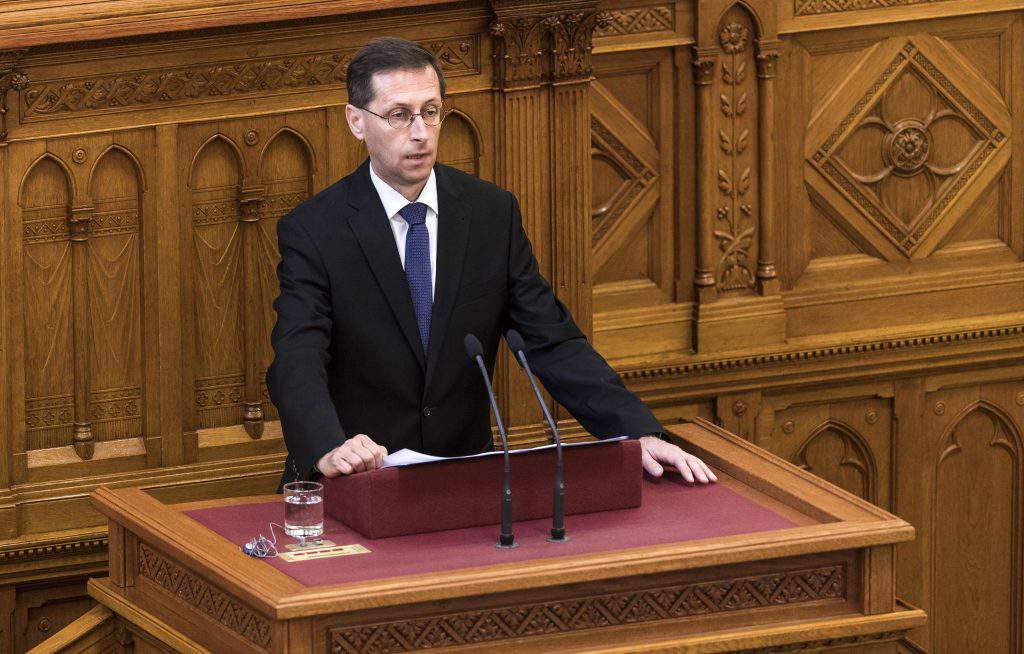Hungary’s budget 2018 – The plenary debate of the bill: Government and Fidesz

Budapest, May 17 (MTI) – Addressing lawmakers at the start of the budget debate on Wednesday, Economy Minister Mihály Varga said the 2018 bill focused on delivering predictability, security and developments.
He noted that the bill contained an economic growth target of 4.3 percent and a budget deficit of 2.4 percent, alongside projected inflation of 3 percent. He added that the policy of reducing the public debt would continue and it was expected that the debt would fall to 70.5 percent of GDP, down by 1.5 of a percentage point from the current year.
At the same time, key public services are set to receive extra funding, he said. Education will receive 81 billion forints (EUR 262m) more than this year, while the health-care sector stands to get 102 billion extra. Pensions, family and social support will get an extra 287 billion forints and 205 billion will go towards economic developments, Varga said. Law and order institutions are set to receive an additional 83 billion, he added.
The minister noted that various types of reserves had been built into the budget amounting to over 200 billion forints, so any unexpected risks could be mitigated.

He also noted that the basic minimum wage is set to rise by 8 percent while the minimum wage for skilled workers would rise by 12 percent.
Varga said the jobless rate was expected to drop to 4 percent thanks to the ongoing fostered jobs scheme and government measures aimed at job-creation.
The flat personal income tax of 15 percent continues to be among the lowest in Europe, he said, adding that a family with two average earners and two children can expect to be better off by 240,000 forints next year compared with 2015 thanks to tax changes. Varga also noted lower VAT rates on some basic foods and internet services.
Taxes on small businesses will be cut by a percentage point to 13 percent and various employment-related contributions are also to be reduced.
Varga said that by the end of 2018 Hungary will have tapped the total amount of European Union funding available and will have paid out a large portion of them to beneficiaries.
The purchasing power of pensions will be preserved, the minister said, and at the same time the Pension Insurance Fund and the Health Insurance Fund will remain in balance next year.
Fidesz: Budget supports employment, families
The 2018 budget is geared towards boosting employment and support for families, ruling Fidesz’s group leader Lajos Kósa said at the plenary debate of the bill on Wednesday.
The economic policy of the past seven years has proved that policy changes can actively influence demographic outcomes, Kósa said. The government has also succeeded in creating a work-based society, he added.
Fidesz MP Erik Bánki said that the real value of wages had increased for 50 months in a row, and next year’s budget aimed towards keeping up this tendency.
Fidesz’s Lajos Szűcs said that the 2018 budget would be the second whereby spending and revenue were balanced so that the deficit financed investments only.
Fidesz MP János Halász called on the opposition parties to “support Hungarian families and those working as employees by supporting the budget bill”. He accused the opposition of grandstanding for “selfish political interests”. He added that there was still time for the opposition to “change sides” by the time of the vote on June 15.
The 2018 budget is very different from those enacted before 2010, when they were drafted by an “incompetent and corrupt” leftist government, he said. Under Fidesz rule, Hungary has become stronger: economic growth exceeds all expectations, deficit goals have been met for the seventh year in a row, taxes are low and wages are high, and the employment rate is at a record high, he said.
Fidesz intends to continue cutting taxes, thereby helping both employees and employers, while guaranteeing the lowest corporate tax rate in Europe, Halász said.
Opposition parties are “ready to support Brussels and [US financier] George Soros, and to accept migrants into the country”, Halász said. By contrast, the government has decided to boost defence spending to counter challenges to European security, he said.
Compared to pre-2010 budgets, the 2018 bill allocates an extra 180 billion forints for health care, 80 billion forints more for education and 15 billion more for home subsidies, Halász said.
Photo: MTI
Source: MTI







